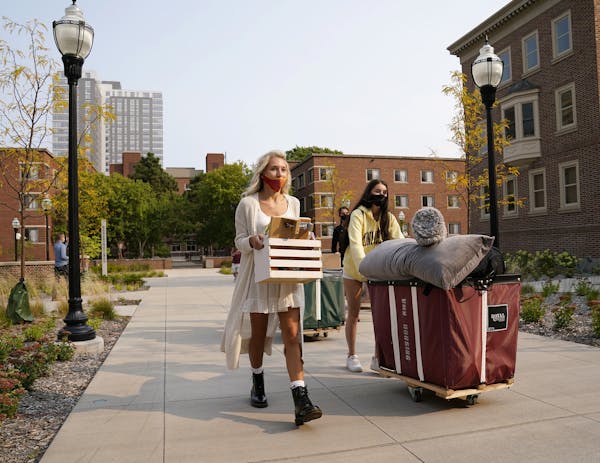A sense of normalcy swept into the southeast Minnesota river town of Winona last month, when thousands of college students returned to live and learn despite the COVID-19 pandemic. They filed into local coffee shops and eagerly mingled with friends after months away.
Their return was highly anticipated by businesses desperate to make up for pandemic-induced losses. Students from Winona State University, St. Mary's University of Minnesota and Minnesota State College Southeast have since breathed some life into the town's economy, but they have also driven a spike in COVID-19 transmission that catapulted Winona onto the list of Minnesota counties where new cases are growing fastest.
"We had been really good about keeping our level pretty even before the students came back, so as those numbers rose in a really big way, that was really concerning to community members," said Christie Ransom, president of the Winona Area Chamber of Commerce.
The reopening of college campuses across the country has amplified town-and-gown tensions in communities where students boost the local economy but also pose risks of spreading the virus to year-round residents. In Madison, Wis., county leaders and University of Wisconsin administrators have sparred over whether to send students home amid rising infection rates. Thirty miles southeast of Winona, the return of University of Wisconsin-La Crosse students has contributed to the city becoming a national coronavirus hot spot.
Minnesota's college towns have largely been spared such outbreaks. Northfield city officials say there has been no apparent increase in cases since St. Olaf College and Carleton College brought some 5,000 students back to town. St. Peter, home to Gustavus Adolphus College and its roughly 2,500 students, has likewise avoided any major increase.
Even in Mankato and Winona, where infections surged as the fall semester began, new cases have been falling. Minnesota State University, Mankato tallied 34 active cases as of Tuesday, down from 129 in early September. At Winona State University, active cases decreased from 209 on Sept. 6 to 76 on Sept. 20; the drop coincided with a two-week campus quarantine enacted to prevent further spread.
"I think part of the novelty of seeing all of our friends again after six months has died off," said Winona State Student Senate President Clara Kuerschner. "And I think the awareness of the rules and the guidelines has increased."
Cases in Winona County are still rising at a higher rate than before students returned to town. But the infections have stayed within the college-age adult population and generally not affected the broader community, Winona City Manager Steve Sarvi said.
In Northfield — the self-proclaimed town of "cows, colleges and contentment" — Carleton and St. Olaf have conducted mass testing of students and faculty and reported few positive cases. Most students live in on-campus housing at the private liberal arts colleges, giving administrators more control over their behavior.
To reduce the risk to the community, school leaders have urged students to venture into town only when necessary.
The outbreaks "that are popping nationally are almost without exception large universities with a lot of off-campus housing," said Eric Runestad, Carleton's vice president and treasurer. "If any college has a shot at doing this well, it's a place like Carleton."
Mixed success for businesses
With fewer students frequenting town, Northfield Mayor Rhonda Pownell said there is notably less hustle and bustle than in a typical year. It's a sign that students are "taking the necessary precautions," she added.
Fewer visitors are passing through, too, with the loss of opening-week festivities, athletic competitions, reunions and other student ceremonies. St. Olaf's Christmas festival, which draws thousands to Northfield, has been canceled. Campus visits, which bring in about 5,000 prospective students and their parents to St. Olaf each year, have gone virtual.
"There is a pretty significant impact that those families make to our city," Northfield Area Chamber of Commerce President Lisa Peterson said. "They stay in our hotels, they eat in our restaurants, they buy gas at our gas stations."
Cafés and coffee shops in Northfield and Winona have generally maintained their customer bases, but bars have seen a drop in business as colleges urge students to avoid social gatherings.
At Blooming Grounds Coffee House in downtown Winona, owner Amy Jo Marks said business this fall has been even better than previous years. When the two-week quarantine at Winona State shut down campus spaces such as libraries, students flocked to the coffee shop to study on its extended outdoor patio.
Where Blooming Grounds has struggled is staffing, Marks said. More than half her staff — many of them students — have had to quarantine at some point because they were exposed to someone who was infected with COVID-19.
"We were running short-staffed for a good month when the students came back," Marks said.
A few blocks away, Mulligan's Irish Pub owner Dan English lamented that business has hardly picked up since students returned to town.
There was an initial boost in the first couple weeks of the semester, English said, but it leveled off after cases rose and the campus quarantine took effect. This fall has not brought the reprieve he had hoped for.
"We're OK right now," English said, but "this can't last forever."
Ransom, the chamber president, fended off calls to shut down bars and restaurants when Winona State experienced the early spike in COVID-19 cases. She argued that such action would not stop Winona students from traveling elsewhere to go to bars.
"Our businesses just wouldn't survive another shutdown," Ransom said.
Excitement and anxiety
The southwest Minnesota town of St. Peter, which has a population of about 12,000, began welcoming some 1,000 students back to town Friday.
Just over 2,000 students are attending Gustavus Adolphus College this fall, but the private school had allowed only half of them to live on campus for the first weeks of the semester. After recording few COVID-19 cases, Gustavus brought the rest of its students back.
There is a mix of excitement and anxiety in the air as locals and businesses brace for the benefits and potential consequences of that decision. Barb Larson Taylor, Gustavus' associate vice president for marketing and communication and president of the St. Peter Chamber of Commerce, hopes students will restore some normalcy to the small town.
"There's a certain level of familiarity that's helpful for people," she said.
Staff news developer Michael Corey contributed to this report.
New Minnesota GOP leaders seek peace with party's anti-establishment wing

Who is Republican Lisa Demuth, Minnesota's first House speaker of color?

Minnesota House GOP, Secretary of State Steve Simon return to Supreme Court
Supreme Court sides with DFL and Simon, says 68 House members needed for floor action

